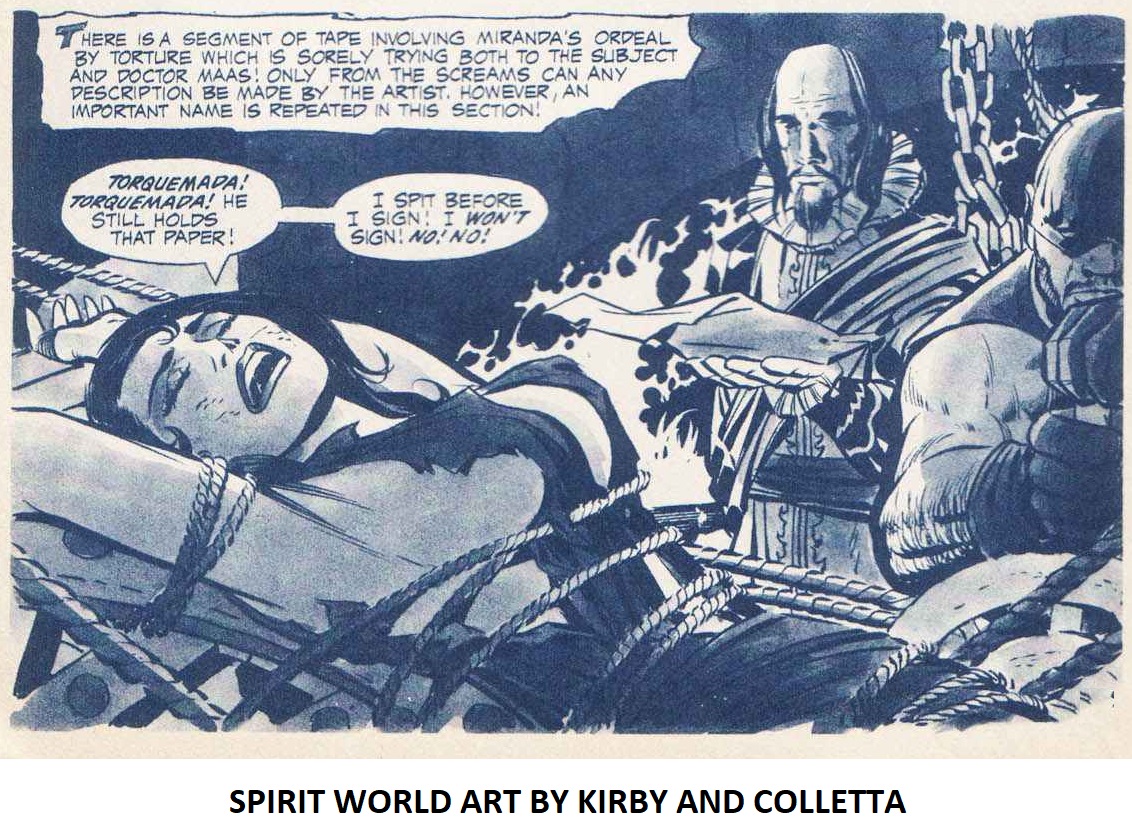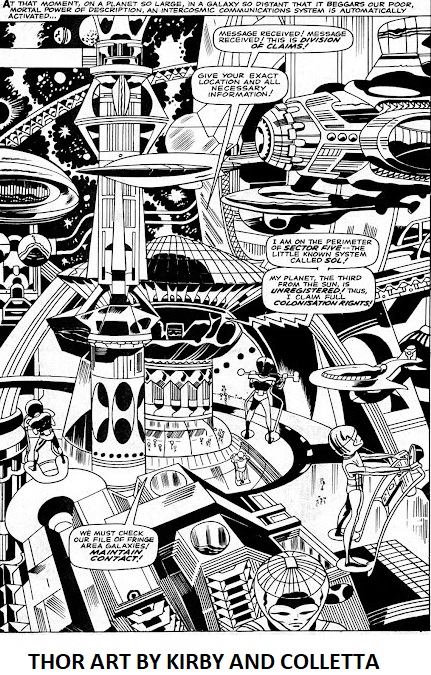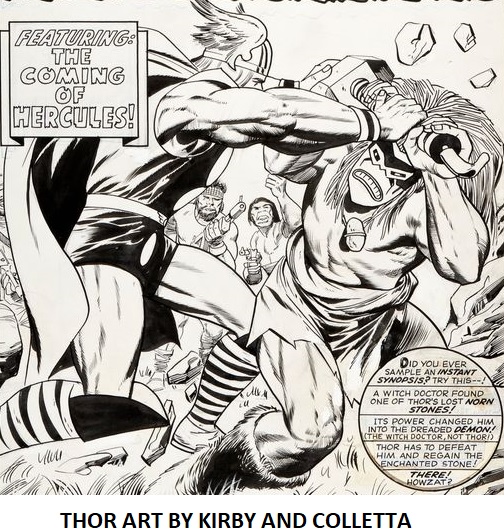Jack Kirby and Vince Colletta – together forever in both fame and infamy. The Kirby legacy is the architect of numerous memorable comic book characters, penciler of dramatic scenes and contributor to the stories we read throughout his career. The Colletta heritage includes being acknowledged as the illustrator of the most beautiful women in comics, go-to guy when deadlines loomed as well as the most prolific creator of any artist in the industry.
Jack and Vinnie worked tirelessly for decades, forgoing vacations and family time in order to earn the incomes necessary to support their respective lifestyles. Both artists made life-changing decisions to escape city life in order to provide their wives and children with upscale environs where they could thrive. These choices meant they would have to spend countless hours each day at their drawing boards. Kirby was a relentless creator while Colletta became the tireless icon of the industry’s need to meet critical cut-off dates. Jack can be credited with originating the stories. Vince can be credited with saving the books.
Pencilers and inkers are typically a different breed from one another. Both require specialized skills. Kirby and Colletta began their careers doing both. Jack drew cowboys, monsters, superheroes and other genres while Vince mainly drew romance books in addition to the occasional fantasy, crime and jungle stories. Each man became preeminent on his respective path. Eventually, however, an artist will come to rely on his or her strong suit in order to succeed. Kirby was not a production inker while Vinnie was. Vinnie did not have the capability of creating insanely-complex machinery and outlandishly rough-and-tumble panels while Jack did. Comic book historians have come to regard Kirby as primarily a penciler and Colletta as principally an inker. Perhaps it was inevitable that they became one of the most enduring art teams in history.
In the early 1960’s, Kirby was penciling stories featuring the character THOR for Marvel Comics. Colletta had a considerably different vision of what the THOR stories should look like. Based on the Hal Foster Prince Valiant books, Vinnie created samples displaying his vision of the Asgardian word of THOR. He took these drawings to editor Stan Lee who instantly fell in love with the illustrative look. Thus, after discussing the proposition of a separate feature with Kirby, Tales of Asgard was born in Journey into Mystery 107 in August, 1964. Shortly thereafter, beginning with Journey into Mystery 116, THOR began it’s lengthy run with Kirby and Colletta as the principal artists.

The Kirby and Colletta team created countless memorable books together but the unquestionable highlight was THOR. In March 1966, the character was given his own book, THOR 126. By this time, Vince was the primary inker over Jack’s exquisite pencils. Dissimilar to all other comic book drawings, the finished product resembled fine art from an earlier time. While all of Kirby’s grandeur was retained, gone were the graphic swipes of India ink used by all other inkers to depict both the characters and their surroundings. The departure drew raucous praise from readers and art aficionados alike. While this elegant look was not suitable for most comic books, in THOR it found a home.
While both men prospered beyond any of their peers, success was not without the attendant criticisms. Kirby had adversarial relationships with management at both Marvel and DC while Colletta developed a reputation for taking short-cuts in order to make his job easier. They have been the subject of many tales and rumors throughout the years. Anyone who succeeds in reaching the top inevitably has to deal with the arrows and slings that are hurled their way in the form of gossip. Since there are so many rumors involved, it is difficult for people to determine whether the claims are factual. What is evident is that without Jack Kirby, Marvel Comics would have very few of the popular superheroes that they own and exploit in books and movies. What is also evident is that without Vince Colletta, hundreds of Marvel and DC monthly releases would have been a regurgitation of seemingly-endless reprints that could have significantly altered company destinies.
The lawsuits involving Kirby and DC editor Jack Schiff surrounding the Skymasters newspaper strip resulted in Jack’s banishment from DC Comics. His issues with Marvel over ownership of characters are also well-documented. While the publishers were less than happy with him, comic book fans mostly sided with Kirby. With Colletta, the main controversy was that he erased and otherwise simplified the penciled art. Most people do not understand the role of what is essentially a publisher’s mercenary. Marvel and DC knew that Vinnie was both willing and capable of making up for the shortfalls of others in order to meet printing deadlines so they exploited him. While the publishers loved him, many pencilers and comic book fans alike voiced their displeasure.

In 1971, tired of quarreling with Marvel, Jack was welcomed back to DC Comics. The publisher created banner advertisements heralding the coming of Kirby who was now more well-known by readers. He brought with him a vision that he named The Fourth World. While never achieving the successes at DC that he did with Marvel, the concepts were innovative. Colletta had been working with DC Comics at the time leading to management’s decision to put Vinnie on Jack’s Fourth World books, including The New Gods.
Kirby had worked with Colletta for years and understood that, in addition to his own stories, the editors were also giving Vinnie an armload of other books each week. Almost all of these were late jobs due to pencilers or editors foul-ups but they needed to be completed quickly so Vinnie hacked them out. The finished art lacked most of the abundant illustrative flourishes he was known for but they were always accurately-inked and the work got done. In the past, Kirby was fine with whatever alterations Vinnie made. Some say they made the pages more readable while others abhorred them. Jack was eventually convinced by those around him to confront Vinnie about some of the liberties he was taking. Their meeting resulted in the end of an acclaimed art team. Colletta always lavished great detail on the main characters and assured Kirby that it would continue. But the inker simply could not promise to ink every line, every doodle, every background building, every tree, etc. without sacrificing his other assignments. A Jack Kirby splash page showing intricate machinery would take most inkers a week to finish. Jack was fortunate to find another competent inker who had no other assignments and could focus on just inking Kirby. And so, a handshake sealed the deal. Both Jack and Vinnie continued on their respective paths without a harsh word between them. It is one of the most important things they had in common. Both men were gentlemen.

